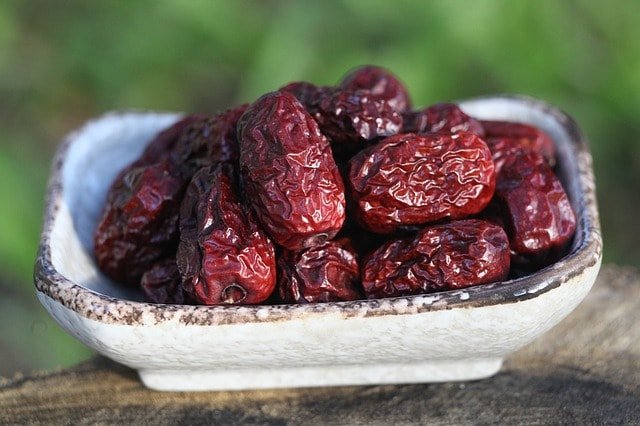
Do you want a short and easy labor?
There are a number of things that you can do to make this happen, such as taking the best prenatal vitamins, engaging in pregnancy exercises, getting a perineal massage, and taking a childbirth education class.
But the simplest and most convenient way to enjoy a healthy labor and delivery is to eat dates.
Yes, according to studies, eating dates during pregnancy is ideal for the best labor and birth.
Expectant mothers who ate 6 dates a day during the 4th week leading up to their due date were significantly found more dilated and more likely to go into labor spontaneously, have a shorter labor phase, have intact membranes upon admission, and avoid Pitocin.
A study in the Journal of Midwifery and Reproductive Health conducted in 2014 also showed that date consumption in late pregnancy can have an impact on the cervical ripening.
Women who ate dates were found to have more successful rates of labor induction, have significant cervical dilation compared to those who don’t eat dates, and have higher Bishop Scores during admission.
All these findings are further supported by a study in March 2017 that concluded positive effect of date consumption during late pregnancy. It also showed that labor and delivery of date eaters are devoid of adverse effect on the mother and child.
What makes dates beneficial to expectant mothers?
- Contains fiber that relieves constipation, lowers risk for preeclampsia and gestational diabetes and helps you stay full for longer.
- Comes with vitamin K that maintains healthy bones and proper blood cutting.
- Has magnesium that alleviates cramps and muscle spasms during pregnancy and supports muscular health.
- Contains enough folate that ensures proper maturation of a baby’s spinal cord and helps prevent neural tube defects.
- Contains natural sugars that offer high energy without spiking blood sugar levels.
It also provides energy, proteins, iron, vitamin K, and a small amount of fat. These are all essential during pregnancy.
What are the benefits of eating dates during pregnancy?
- Provides energy
100 grams of dates contain 277Kcal of energy and the right amount of natural sugars that give your body more energy than usual.
Since you need all the energy you can get, eating a handful of dates daily will supply essential sugars minus the extra calories.
- Prevents constipation
As previously mentioned, fiber can relieve constipation. Dates are a rich source of fiber that can prevent and treat pregnancy-related constipation and keep your digestive system healthy at the same time.
The fruit will also make you feel full for longer which helps in maintaining a healthy weight and reduce your cholesterol level.
- Increase amino acid production
Every 100 grams of dates contain 1.8 grams of proteins, a sufficient amount for the body to build amino acids that are essential for growth.
- Prevent birth defects
Folate is the one thing that pregnant mothers need to help prevent birth defects related to spinal cord and the brain. Since dates are a good source of folate, eating them during pregnancy is good for you and your baby.
- Promotes bone and teeth formation in babies
Dates contain magnesium that is responsible for the formation of bones and teeth in babies. It also regulates blood sugar and blood pressure levels and helps prevent liver and kidney abnormalities brought on by magnesium deficiency.
- Boost vitamin K
Low vitamin K is the norm for newborn babies, something that must be remedied when breastfeeding. Experts recommend that pregnant mothers must consume dates to meet the baby’s requirement of the vitamin when they are born.
With sufficient amount, vitamin K can also aid in bone development and clotting.
- Prevents anemia
Dates contain iron that strengthens both the mother’s and baby’s immunity and maintains the body’s hemoglobin. This effectively keeps anemia at bay. With 0.9 mg of iron for every 100g of dates, you should eat dates when you’re expecting.
- Maintains balance between water and salt
Potassium is one of the nutrients that dates contain. Something pregnant mothers must have more of because a deficiency can lead to kidney-related issues.
Potassium also maintains water-salt balance, helps prevent muscle cramps, and regulates blood pressure.
- Helps in labor
The fatty acids in dates, both saturated and saturated, produce prostaglandins required for labor and supplies the energy mothers need during labor.
The calcium, tannin, and serotonin in dates also help in the uterine muscle contractions that contribute to an easy labor.
How to eat dates during pregnancy
Eating dates earlier in your pregnancy is not a problem, provided that you don’t have blood sugar problems.
Eat in moderation during the first trimester to prevent constipation.
Consult with your doctor when you want to continue eating dates during the second trimester to prevent the risk of developing gestational diabetes.
To be safe, start eating 6 dates daily from 36 weeks on or during the third trimester.
Opt for the organic variety.
You can consume dates as a dessert, sweetener, syrup, salad dressing, pureed and added into a pie crust dough, and as a parfait.




